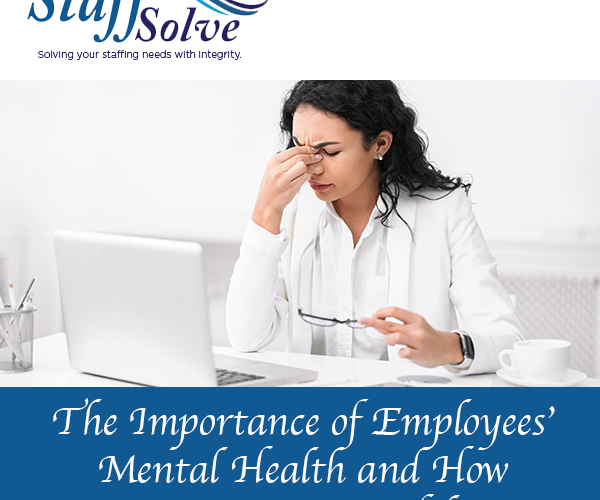
The Importance of Employees’ Mental Health and How Managers Can Help
- On June 17, 2021
Chronic stress has long been an impediment to a healthy workplace, especially when it applies to an employee’s mental health. It can have employees feeling mentally detached from work and becoming less effective in their job. The most common cause of that? Heavier workloads, due in part to employers adjusting team size during the pandemic and top performers leaving for new opportunities.
Beyond heavier workloads, stress for workers regardless of being remote or in-office often include not being able to interact with colleagues like they used to, toxic work environments, caring for children or elders during the workday, and the general uncertainty about work and the economy as the state of the pandemic fluctuates in many cities and states.
Companies play a crucial role in determining how well their organizations address their employees’ general well-being. There are several approaches, depending on the specific stress factor and the general state of the employee’s life both in the office and out. The first step in assisting mental health is communication and empathy. Being such can persuade employees to share their feelings about the job, and if comfortable, their personal life. Managers who show a willingness to share their own stories result in employees feeling support and empathy, making them feel free to open up and help you create solutions before it becomes a bigger problem. Talking regularly with your team is your most powerful tool for reducing stress (and potential burnout) as well. Effective communication has always been a top management skill, but it’s a major responsibility when employees are no longer all physically together in a central location. A good rule of thumb is to talk one-on-one or to small groups of employees 2-3 times more than you would in an office.
The next step in understanding and assisting employees to ensure proper mental health is to listen carefully to get a true sense of how they’re feeling and coping with their stress. Stress can also come from your staff having seen friends and family members being laid off, which can easily lead to feelings of job insecurity of their own. In-person discussion may be difficult, but utilizing video calls can help teams feel less alone. Quick 15-minute group check-in calls or meetings on a weekly basis that are separate from scheduled business meetings are very beneficial. However, ensure that groups are not too large, as it can make more introverted personalities feel less comfortable to share.
Work-life imbalances often reflect increased stress. People having too much work due to staff cuts companies have to increase the stress of current employees since their responsibility has grown without some adjustment. Even if you’re not able to hire additional workers, you can relieve some of the pressure by bringing in skilled contract professionals to help out. You can also give remote employees more flexibility by suggesting windowed working. Windowed working means allowing them to break up their workday with breaks to take care of personal responsibilities, from laundry to childcare. Even just knowing that they’re not chained to their computers from 8 a.m to 5 p.m. can be a huge mental relief. A bonus for implementing this type of schedule is when returning, they are more likely to be fresh and refocused.
Nothing helps reduce stress and stave off burnout like time off. Not having enough of it in the past year has played a significant role in chronic stress and burnout among workers. Encouraging staff to take the time off they’ve earned can allow them to simply take it easy for a while, even if they don’t take a big vacation. Some time to relax at home is sometimes the best trick. You should also discourage them from checking in with work so they feel free to be completely unplugged from the office.
Efforts to create a workplace conducive to good employee mental health will not only benefit your employees but also your business. Studies estimate companies can yield a 5-fold return on investment. This is because companies invest in time and effort, and not just the numerical value, of their employees.
Staff Solve continues to provide high-quality candidates, employment tips and advice, and jobs in diverse markets for over 27 years. Let Staff Solve take the stress off you so you can focus on your business by finding the perfect applicant for the position. If you are looking for employment, please visit our job seeker page. For more news and advice, check out our news and articles page. If you would like more information about the services we offer employers, visit our employer page or contact us today.

0 comments on The Importance of Employees’ Mental Health and How Managers Can Help